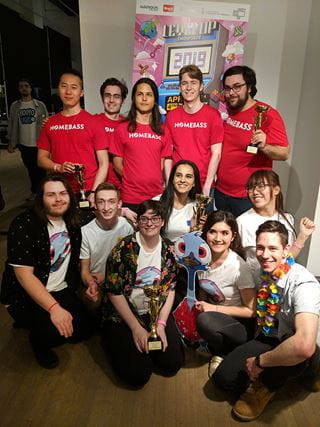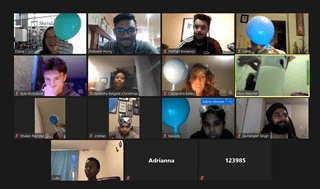
Researcher Spotlight: Dr. Sara Cumming
Dr. Sara Cumming is a professor in Sheridan’s Faculty of Humanities and Social Sciences and the lead researcher on a 2021 NSERC - College and Community Social Innovation Fund grant for her highly collaborative research, titled “Community Ideas Factory: The Life Skills Project”. This innovative research project is focused on effective life skills programming for marginalized and/or precariously housed individuals in Halton Region. Here, Dr. Cumming delves into her research, broader interests, and the personal passions that underpin her work.

Your past research has centered around solving community-based issues for vulnerable populations, with a focus on single-parent families across Canada. What initially drew you to this area of research?
Dr. Cumming: My brother and I were raised by a teenaged single mother receiving social assistance. By the time I was 22, I was also a single mother living on a minimum wage serving job. I know all too well the difficulties that single mothers experience as they try to navigate government systems, caretaking and breadwinning responsibilities, and the stigma that’s attached to single mothers. Breaking the chains of poverty is incredibly difficult once you are trapped in the cycle of generational poverty. Accessing mentorship and education drastically changed my life circumstances and propelled me to work in this area.
Can you tell us more about the research you’re currently working on?
Dr. Cumming: I have been working with a local not-for-profit in Halton Region called Home Suite Hope. The organization provides a wraparound approach to helping homeless, single parent-led families to reach self-sufficiency. As part of the programming, participants must complete one year of life skills training. Research shows that there are many complex reasons for homelessness, however, a lack of life skills is a significant contributor to repeated bouts of homelessness. During the COVID-19 pandemic, the Halton Region partnered with Home Suite Hope to offer life skills training to other community members struggling with maintaining housing. It was through these experiences that I began to note some serious gaps in this type of training.
Multiple not-for-profit organizations offer life skills training to their participants, which made it confusing for community members attempting to access services. Not-for-profits are often hard-pressed to make their annual budgets and yet each one spends money on building, hosting, and facilitating life skills training. Moreover, as a sociologist, I could see that the training was neither client-centric, nor was it informed by the principles of equity, diversity, and inclusivity (EDI). The pandemic presented us with an opportunity to understand the functionality of using a virtual platform to teach life skills including financial literacy, food literacy, health and wellness, etc. This project hopes to fill this gap with a collaborative, client-centric, EDI-informed virtual life skills to be shared across Halton and the surrounding area.
Why is this area of research so important and how has the involvement of 15 not-for-profit organizations in the Halton community assisted in furthering your research?
Dr. Cumming: Halton Region works from a “housing first” perspective, meaning that homeless or precariously housed individuals are rapidly housed and then given the services that they need to work through the myriad of challenges in their lives. We can help people become housed, however if they are not equipped with life skills to maintain their housing, they will just end up homeless again. Many homeless individuals received extremely poor socialization throughout their lives. Some do not have proper identification, bank accounts, understandings of cleanliness and food safety, or how to access healthcare. Life skills are paramount! It's incredibly important to have access to life skills that are culturally sensitive and include diverse ways of being and living. Organizations such as YMCA, Food For Life, Halton Women’s Place, and many more, are leaders in the community with a common desire to ensure we do not let people slip through the cracks of programming. They want to provide the very best programming to all citizens who need it - not just the ones in their organization. Additionally, they all have expertise with particular segments of the population and can bring their participants’ voices to the project.
What does research mean to you?
Dr. Cumming: Collaboration is at the core of everything I do. We need to lean on our strengths and partner with others who have different strengths. I work very closely with these 15 organizations and I know they are all committed to finding solutions to barriers that our vulnerable populations face. They are working together to build the most client-centric and applied program possible so that we can help prevent homelessness. This is what is so rewarding for me about this research - It has the potential to impact the lives of tens of thousands of people annually.
In addition to your research work, you also serve as Executive Director of Home Suite Hope. What misconceptions do you find are the most prevalent when it comes to this segment of the population?
Dr. Cumming: One of the most frustrating things we deal with in Halton is the stigma attached to single mothers. Single mothers are viewed as immoral and incapable, despite the fact that they are the parent that is doing the work. We have a very hard time finding landlords willing to rent to our families despite the fact that they are working so hard to improve their life circumstances while also being entirely responsible for caretaking. Many believe that single mothers are young and have made foolish choices. However, the vast majority of our parents are in their mid-to-late 30s and ended up in our programming after the dissolution of their marriages. Most had taken on the traditional caretaking role in their marriages and didn’t work outside the home. When their husbands left the marriage (or in many cases when they escaped domestic violence) they didn’t have the necessary skills or supports to enter the labour market. The single mothers are working hard to ensure that their children have a sightline to a better life - one that includes education and fulfilling employment.
What is next for you?
Dr. Cumming: I am currently working on this Life Skills project and on another Colleges and Institutes grant with Sheridan colleagues for a project about gender equality in Kenya. Both projects are three years in length. I hope that I can start working on publishing all this work that I’m involved in.
Background
Dr. Sara J. Cumming is a professor of Sociology in the Faculty of Humanities & Social Sciences at Sheridan College, and the Executive Director of Home Suite Hope. She is an award-winning applied sociologist with a PhD in Sociology from the University of Waterloo. Dr. Cumming’s doctoral work focused on the intersections of gender, social policy, and work for lone mother families across Canada. She has expanded her work to focus specifically on collaborative and participatory approaches to solving community-based issues for vulnerable populations. She was recently the second Canadian ever to receive the designation as a Clinical Sociologist by the Association for Applied and Clinical Sociology.
Media Contact
For media inquiries, contact Sheridan’s Communications and Public Relations team.



